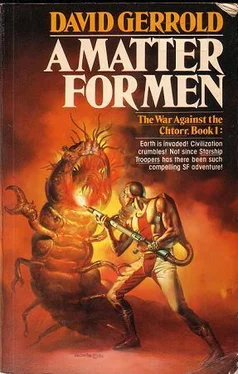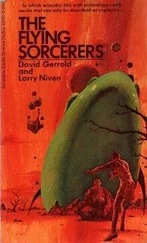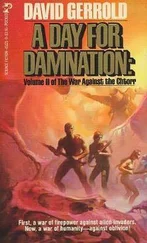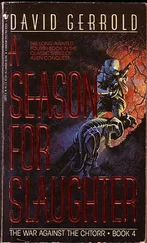David Gerrold - A Matter for Men
Здесь есть возможность читать онлайн «David Gerrold - A Matter for Men» весь текст электронной книги совершенно бесплатно (целиком полную версию без сокращений). В некоторых случаях можно слушать аудио, скачать через торрент в формате fb2 и присутствует краткое содержание. Год выпуска: 1983, Жанр: Боевая фантастика, на английском языке. Описание произведения, (предисловие) а так же отзывы посетителей доступны на портале библиотеки ЛибКат.
- Название:A Matter for Men
- Автор:
- Жанр:
- Год:1983
- ISBN:нет данных
- Рейтинг книги:4 / 5. Голосов: 1
-
Избранное:Добавить в избранное
- Отзывы:
-
Ваша оценка:
- 80
- 1
- 2
- 3
- 4
- 5
A Matter for Men: краткое содержание, описание и аннотация
Предлагаем к чтению аннотацию, описание, краткое содержание или предисловие (зависит от того, что написал сам автор книги «A Matter for Men»). Если вы не нашли необходимую информацию о книге — напишите в комментариях, мы постараемся отыскать её.
A Matter for Men — читать онлайн бесплатно полную книгу (весь текст) целиком
Ниже представлен текст книги, разбитый по страницам. Система сохранения места последней прочитанной страницы, позволяет с удобством читать онлайн бесплатно книгу «A Matter for Men», без необходимости каждый раз заново искать на чём Вы остановились. Поставьте закладку, и сможете в любой момент перейти на страницу, на которой закончили чтение.
Интервал:
Закладка:
"But if they're giving things away, then why the registration cards?"
"To give a semblance of control, maybe. To give us the feeling there's still some authority in the world. You notice how industrious some of these people seem? Maybe it's to keep themselves going-because if they stop for even a moment and realize-" He caught himself. "Come on, get that cart."
We picked up toilet paper, a couple of radiophones, some cartons of canned goods and freeze-dried foods, a new first-aid kit, some vitamins, some candy for the kids, a newspaper, rifle shells and so on. The only things we couldn't afford were the fresh meats and vegetables. Those had to be paid for-in United Nations Federal Kilo-Calorie notes, caseys for short.
"Aha-yes. The nickel drops."
"What?"
"What's the only thing in short supply today, Jim?"
"People."
"Trained skills. That's what they're trading here. Ability. Labor. That's the new money-standard. Or it will be." He looked almost happy. "Jim"-he grabbed my shoulders abruptly-"it's over. These people are organizing for survival, for a future. There's work to do and they're doing it. They have hope." His grip was tight. "We can come down from the mountain now. We're needed. All of us. Your mom's a nurse. Maggie can teach. ... " His eyes were suddenly wet. "We made it, Jimmy. We made it through to the other side!"
But he was wrong. We hadn't even seen the worst of it yet.
NINE
THE PLAGUES weren't over.
But this time we were better prepared. We had vaccines, and the lower population density and all the precautions still in effect from the first calamitous waves slowed the spread of the new plagues to a containable crawl.
The one that hit us was supposed to be one that you could recover from, although it might leave you blind or sterile-or permanently deranged. It had been around since the beginning -it just hadn't been noticed until the others were contained. Not controlled, just contained.
We lost the boys to it-Tim and Mark-and we almost lost Dad too. Afterward, he was a different man. He never fully recovered. Haggard and gray, he was almost a zombie. He didn't smile anymore. He'd lost a lot of weight and most of his hair, and suddenly he looked old. It was as if the mere act of surviving had taken all of his strength; he didn't have any left for living. A lot of people were like that.
And I don't think Maggie ever forgave him for the death of her sons. It had been his decision to bring us down from the mountain by July, but he couldn't have known. No one did. We all thought it was over.
The last time I saw him was when he left for San Francisco.
They'd "drafted" him-well, not quite drafted, but the effect was the same. Someone was needed to manage the reorganization of the Western Region Data Banks, and Dad was one of the few free programmers left. Most of those who'd survived had already nested themselves into security positions; programmers were valuable-without them, the machines would stop. But Dad was still a free agent, and therefore subject to the control of the Labor Requisition Board. He'd been right to be cautious about registering. When we came down from the mountain, his orders were waiting for him. He appealed,but it was rejected. The national welfare came first.
I drove Dad down to the train station that last day. Mom couldn't get away from the clinic-she'd made her goodbyes the night before. Maggie wouldn't come. Dad looked very thin. He carried only a single small suitcase. He didn't say much while we waited for the train to arrive. We were the only ones on the platform.
"Dad? Are you all right? You know, if you're ill-"
He didn't look at me. "I'm all right," he snapped. And then he said it again in a quieter tone. "I'm all right." He still wasn't looking at me, he was still staring down the track, but he reached over and put his hand on my shoulder.
"Do you need to sit down?"
He shook his head. "I'm afraid I might not be able to get back up." He said, "I'm tired of this, Jim. I'm so tired. . . ."
"Dad, you don't have to go. You have rights. You can claim the shock of-"
"Yes, I do," he said. And the way he said it left no room for argument. He dropped his hand from my shoulder. "You know about the guilt, Jim-survivor's guilt? I can't help it. There were people who deserved to live. Why didn't I die instead?"
"You did what you had to!"
"Just the same," he spoke haltingly, "I feel ... a responsibility now ... to do something, to make amends. If not to the rest of the world, then to ... the babies. Tim and Mark."
"Dad"-this time I put my hand on his shoulder-"listen to me."
He turned to me. "And I can't stand the look in her eyes anymore!"
"Maggie?"
"Your mother."
"She doesn't blame you!"
"No, I don't think she does. And she has every good reason to. But it's not the blame, Jim-it's the pity. I can't stand that." He faltered, then said, "Maybe it'll be better this way." He stooped to lower his suitcase to the ground. Very slowly, he put his hands on my shoulders and pulled me close for a last hug. He felt even thinner in my arms than he looked.
"Take care of them," he said. "And yourself."
He pulled back and looked at me, searching my face for one last sign of hope-and that was when I saw how old he had become. Thin and gray and old. I couldn't help it. I felt sorry for him too. He saw it. He had been looking for my love, and instead he saw my pity. I knew he could tell, because he smiled with a false heartiness that felt like a wall slamming into place. He clapped me on the shoulder and then turned quickly away.
The train took him south to San Francisco and we never saw him again.
It took the Bureau of Labor Management a lot longer to catch up to me, almost a year.
I had gone back to school. They had reorganized the State University system and you could get study credits for working on a campus reclamation team, saving and preserving the state of human knowledge as it existed before the plagues. It seemed in those first hectic months that everyone was an official of some kind or other. I even held a title or two. For a while, I was Western Regional Director of the Fantasy Programmers' Association-I only did it because the president of the organization insisted. She said I owed it to my father's memory as an author. I said, "That's hitting below the belt, Mom," but I took the job. My sole responsibility was to sit down with a lawyer and witness a stack of documents. We were claiming the copyrights of those authors who had not survived and for whom no surviving kin could be located. The organization was becoming the collective executor of a lost art form, because no one had the time for large-scale fantasy games anymore.
Halfway through the spring semester, I was drafted-really drafted, not labor-requisitioned.
The army was one of the few institutions that was structured to cope with massive losses of manpower without loss of structure; its skills were basic, widespread and nonspecialized. Therefore, it was the army that managed the process of survival. The army reestablished communications and maintained them. The army took charge of resources and utilities, protecting and allocating them until local governments were again able to assume the responsibilities of control. The army distributed food and clothing and medical aid. The army contained the plague districts until decontamination teams could be sent in-and as ugly as that latter task was, they handled it with as much compassion as was possible under the circumstances. It was the army that carried the country through the worst of it.
But that wasn't the army that I was drafted into.
Let me say this: I hadn't believed in Chtorrans any more than anybody else.
Nobody I knew had ever seen a Chtorran. No reputable authority had ever come forward with any proof more solid than a blurred photo, and the whole thing sounded like another Loch Ness monster or Bigfoot or Yeti. If anyone in the government knew anything, they weren't saying-only that the reports were "under investigation."
Читать дальшеИнтервал:
Закладка:
Похожие книги на «A Matter for Men»
Представляем Вашему вниманию похожие книги на «A Matter for Men» списком для выбора. Мы отобрали схожую по названию и смыслу литературу в надежде предоставить читателям больше вариантов отыскать новые, интересные, ещё непрочитанные произведения.
Обсуждение, отзывы о книге «A Matter for Men» и просто собственные мнения читателей. Оставьте ваши комментарии, напишите, что Вы думаете о произведении, его смысле или главных героях. Укажите что конкретно понравилось, а что нет, и почему Вы так считаете.












